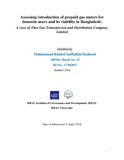| dc.contributor.advisor | Islam, Mohammad Sirajul | |
| dc.contributor.author | Hashemi, Muhammad Khaled Saiffullah | |
| dc.date.accessioned | 2018-06-03T04:13:33Z | |
| dc.date.available | 2018-06-03T04:13:33Z | |
| dc.date.copyright | 2018 | |
| dc.date.issued | 2018 | |
| dc.identifier.other | ID 17382017 | |
| dc.identifier.uri | http://hdl.handle.net/10361/10234 | |
| dc.description | | en_US |
| dc.description | This dissertation is submitted in partial fulfillment of the requirements for the degree of Masters in Procurement and Supply Management, 2018. | |
| dc.description | Cataloged from PDF version of dissertation. | |
| dc.description | Includes bibliographical references (page 33). | |
| dc.description.abstract | Bangladesh has limited resources of Natural Gas and it will not last if not used cautiously.
In Bangladesh, Gas consumption of domestic customers is not metered and they are not cautious
about the gas usage. Prepaid meter will ensure that customers will not waste gas as they have to
pay for the exact amount of gas they use.
Natural Gas is distributed to the customer through quite a few distribution companies in
Bangladesh, among them Titas Gas Transmission and Distribution Company Limited
(TGTDCL) is the largest. Prepaid Gas meter was first introduced in Bangladesh in 2004 at
Banani Residential Area which is under TGTDCL franchise area.
This study examines how and up to what extent natural gas wastage in domestic customer
premises of TGTDCL can be reduced by the implementation of pre-paid gas metering system.
Pre-paid gas metering system is a new concept in Bangladesh. This study also examines whether
this system is acceptable to TGTDCL domestic customers or not. This study also examines the
financial and economic viability of implementing pre-paid gas metering system in TGTDCL.
In the study it was found that significant amount of gas is saved by the implementation of prepaid
metering system in domestic customer premises and this saved gas can be used by industrial
or commercial customers, which results increase in TGTDCL revenue. Domestic Customers also
welcomed this new concept as it reduced their utility costs if they use it cautiously. Some
customers are not willing to use this system as recharging points of prepaid gas meter cards are
far away from their home, some customers are not happy with TGTDCL service. TGTDCL also
benefited by the system as there is no outstanding bills. It was also found in the study that though
it is not financially viable for TGTDCL to implement this system, it is economically viable for
the organization.
As, there is a huge gap in demand and supply of natural gas in Bangladesh, Prepaid gas meter
should be introduced to reduce wastage in the domestic customer premises. TGTDCL should
give more emphasis on prepaid customer service and also they need to increase more recharging
points in order to buy in customers into prepayment system. | en_US |
| dc.description.statementofresponsibility | Muhammad Khaled Saiffullah Hashemi | |
| dc.language.iso | en | en_US |
| dc.publisher | BRAC Univeristy | en_US |
| dc.rights | BRAC University dissertations are protected by copyright. They may be viewed from this source for any purpose, but reproduction or distribution in any format is prohibited without written permission. | |
| dc.subject | Titas Gas | en_US |
| dc.subject | Prepaid gas meter | en_US |
| dc.subject | Natural gas | en_US |
| dc.subject | TGTDCL | en_US |
| dc.title | Assessing introduction of prepaid gas meters for domestic users and its viability in Bangladesh: a case of Titas Gas Transmission and Distribution Company Limited | en_US |
| dc.type | Dissertation | en_US |
| dc.contributor.department | BRAC Institute of Governance and Development, BRAC University | |
| dc.description.degree | M. Procurement and Supply Management | |

